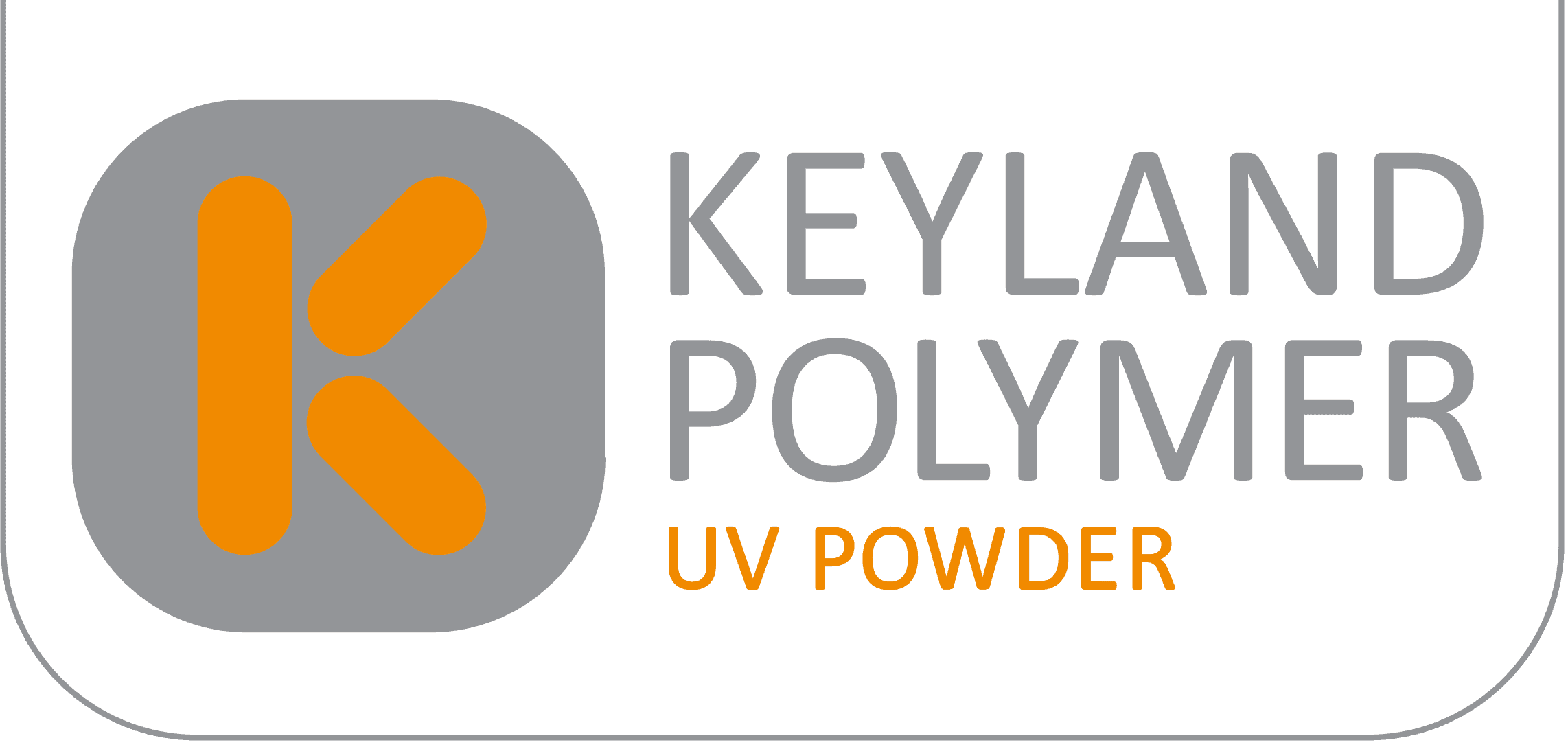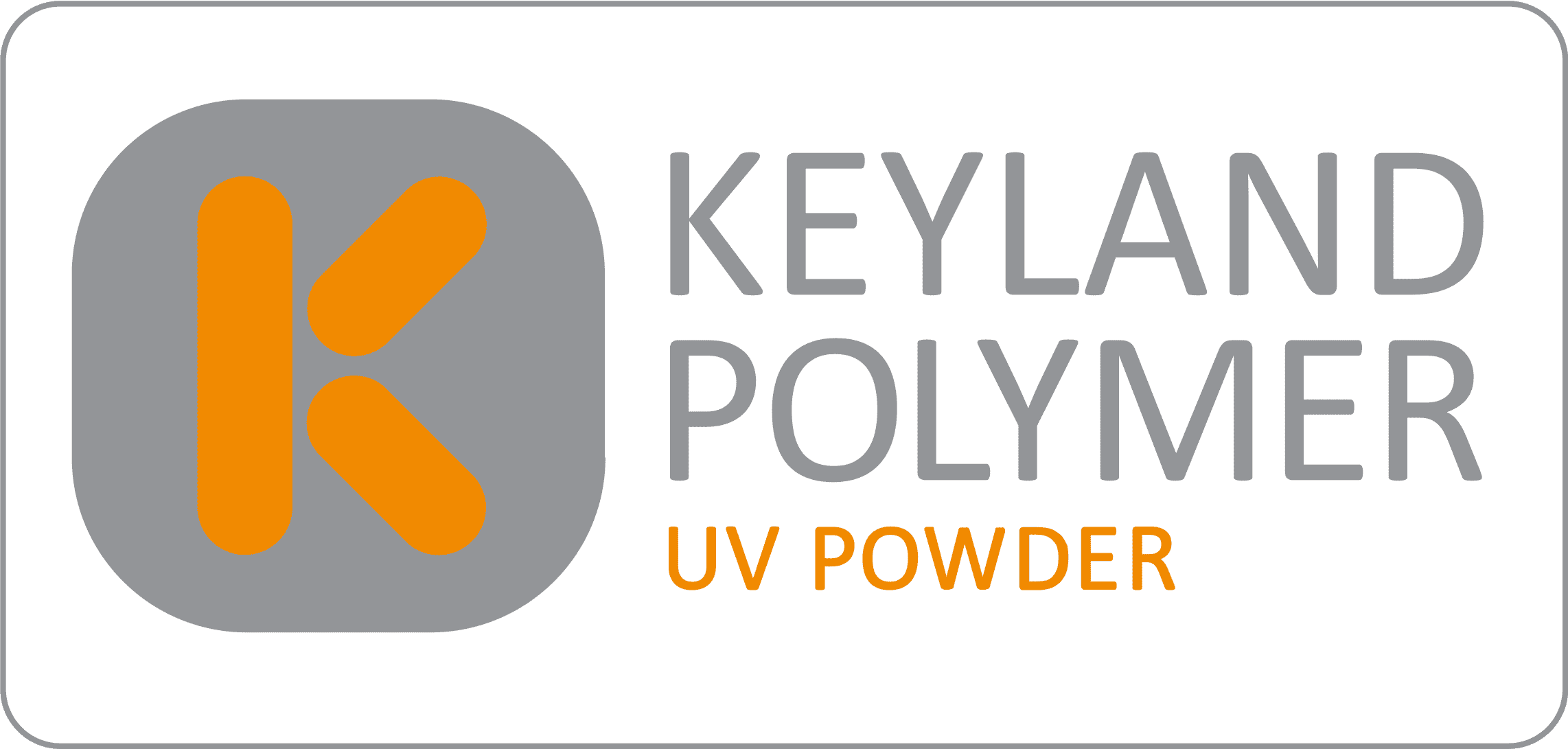New Opportunities for UV Curable Powder Coating
Coatings World Magazine May 2011
Authors Ryan Schwarb, Formulation and Production Manager, Keyland Polymer Ltd. & Michael Knoblauch, President DVUV Holdings
The growing demand for radiation cured coating technology brings into focus the significant economic, environmental and process benefits of UV curing. UV cured powder coatings fully capture this trio of benefits. As energy costs continue to increase, the demand for “green” solutions will also continue unabated as consumers demand new and improved products and performance.
Markets reward firms that are innovative and adopt new technologies by incorporating these technological advantages into their products and or processes. Developing products that are better, faster and cheaper will continue to remain the norm that drives innovation. The purpose of this article is to identify and quantify the benefits of UV cured powder coatings and demonstrate that UV cured powder coatings meet the “Better, Faster and Cheaper” innovation challenge.
UV Curable Powder Coatings
Better = Sustainable
Faster = Lower energy consumption
Cheaper = More value for less cost
Market overview
Sales of UV cured powder coatings are expected grow at least three percent per year for the next three years, according to Radtech’s February 2011, “Update UV/EB Market Estimates Based on Market Survey.” UV cured powder coatings contain no volatile organic compounds. This environmental benefit is a significant reason for this expected growth rate.
Consumers are becoming ever more conscious of the health of the environment. The cost of energy is influencing buying decisions, which are now based upon a calculus that includes sustainability, energy and total product life cycle costs. These buying decisions have ramifications up and down supply chains and channels and across industries and markets. Architects, designers, material specifiers, purchasing agents and corporate managers are actively seeking out products and materials that meet specific environmental requirements, whether they are mandated, such as CARB (California Air Resources Board), or voluntary, such as SFI (Sustainable Forest Initiative) or FSC (Forest Stewardship Council).
UV powder coating applications
Today, the desire for sustainable and innovative products is greater than ever. This has driven powder coating manufacturers to develop coatings for substrates never previously powder coated. New product applications for low temperature coatings and UV cured powder are being developed. These finishing materials are being used on heat sensitive substrates such as medium density fiberboard (MDF), plastics, composites and preassembled parts.
UV cured powder coating is a very durable coating, enabling innovative design and finishing possibilities and can be used on a vast array of substrates. One substrate commonly used with UV cured powder coating is MDF. MDF is a readily available biproduct of the wood industry. It is easy to machine, is durable and used in a variety of furniture products at retail including point of purchase displays and fixtures, work surfaces, healthcare and office furniture. UV cured powder coating finish performance can exceed that of plastic and vinyl laminates, liquid coatings and thermal powder coatings.
Many plastics can be finished with UV cured powder coatings. However, UV powder coating plastic does require a pretreatment step to make an electrostatic conductive surface on plastic. To assure adhesion surface activation may also be required.
Pre-assembled components containing heat sensitive materials are being finished with UV cured powder coatings. These products contain a number of different parts and materials including plastic, rubber seals, electronic components, gaskets and lubricating oils. These internal components and materials are not degraded or damaged because of UV cured powder coatings exceptionally low process temperatures and fast processing speed.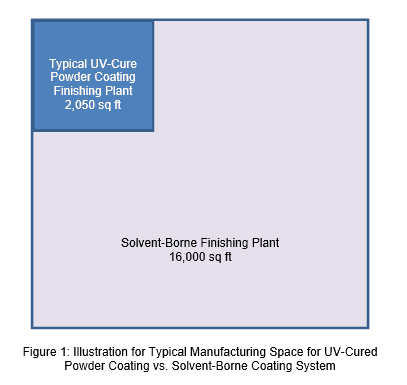
UV powder coating technology
A typical UV cured powder coating system requires about 2,050 square feet of plant floor. A solventborne finishing system of an equal line speed and density has a footprint in excess of 16,000 square feet. Assuming an average lease cost of $6.50 per square foot per year, the estimated UV cure system annual lease cost is $13,300 and $104,000 for a solvent borne finishing system. The annual savings is $90,700. The illustration in Figure 1 is a graphic representation of the scale difference between the footprints of a UV cured powder system and solventborne finishing system.
The electrostatic powder application function of a UV cured powder coating system and a thermoset powder coating system are the same. However, the separation of the melt/flow and the cure process functions is the differentiating characteristic between the UV cured powder coating system and the thermal powder coating system. This separation enables the processor to control the melt/flow and cure functions with precision and efficiency, and helps maximize energy efficiency, improve material utilization and most importantly increase production quality.
UV powder coating’s time advantage
The “Faster” advantage of a UV powder coating system is the shorter process time, which equates to an increased finishing capacity and lower energy consumption. A UV cured powder coating system can produce more product, uses less energy and increase first pass quality. Set-up times are shorter, thermal damage to substrate is virtually eliminated and process failures are greatly reduced.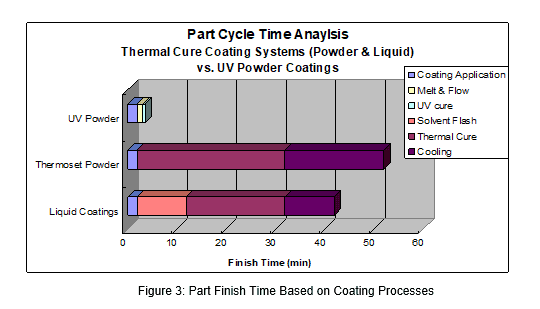
Liquid finishing requires solvent flash-off and thermal curing requires 30 minutes or more. Although thermoset powder coatings do not require solvent flash, the cure temperatures are higher at 400°F, requiring an additional cooling period prior to handling. The UV cured powder coating process significantly reduces process times, generating a number of process and efficiency benefits. These include less time waiting on daily start-up and shut down; increased finish capacity; a reduced number of parts on the finishing line; and a reduction in defects and reworks.
The short and fast process times for UV cured powder systems increases the daily finishing capacity and generates additional marginal revenue for the user. A typical UV powder system can finish 1,150 parts in an eight-hour production day. A comparable solventborne thermal cure system has the capacity to finish 950 parts. The UV powder system will finish 200 more parts in a day increasing productivity by 21 percent. For example, a finished product selling for $10 per part with 30 percent gross margin generates an additional $600 per day of marginal revenue, or $150,000 per year.
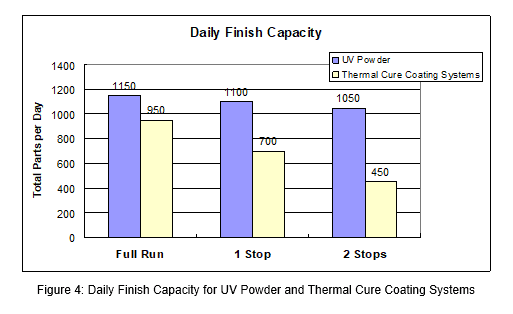 An additional benefit to a shorter process time is the ability to respond faster and resolve any processing issues. In a typical finishing operation, it is very difficult to identify problems until the part has been coated, cured and is approaching the end of the process cycle. The shorter process time of UV powder enables faster identification of problems and implementation of corrective actions. In a thermal cure system, once defective finished parts are identified and adjustments are made, the finishing line may hold over 300 feet of potentially defective parts, all of which will need to be inspected and possibly reworked or scraped.
An additional benefit to a shorter process time is the ability to respond faster and resolve any processing issues. In a typical finishing operation, it is very difficult to identify problems until the part has been coated, cured and is approaching the end of the process cycle. The shorter process time of UV powder enables faster identification of problems and implementation of corrective actions. In a thermal cure system, once defective finished parts are identified and adjustments are made, the finishing line may hold over 300 feet of potentially defective parts, all of which will need to be inspected and possibly reworked or scraped.
Value of UV cured powder coating
UV powder coatings have many operating efficiencies that can be directly correlated to the value of the system, or the “Cheaper” part of the innovation challenge. A UV cured powder coating has an applied material cost advantage compared to low solids solventborne coatings. A solventborne industrial coating is composed of 25 percent solids and has a 30 percent material utilization with a conventional spray application. A 1 mil dry film thickness has an applied cost of $0.28 per square foot. UV cured powder coatings contain no solvents or liquids and are 100 percent solid with up to a 95 percent material utilization in the finishing operation. A UV cured powder film build of 2 mils on a smooth substrate produces a continuous and uniform finish. The applied material cost of a 2 mil film thickness is $0.11 per square foot. Rougher substrates such as MDF require 3-3.5 mils of powder finish with an applied material cost of $0.17 per square foot. The 2 mil UV powder finish is 60 percent cheaper than the 1 mil solvent liquid finish. The user will save $170,000 per year finishing one million square feet using the UV powder system. The chart on the next page totals the various cost benefits of UV cured powder coatings.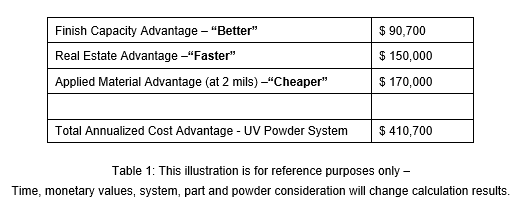
Conclusion
The environmental benefits, energy savings and the operating efficiencies of UV curable powder coatings are evident, demonstrable and measurable. The market for UV curable powder coatings will continue to grow as users and consumers become more aware of the advantages of this innovative material chemistry and finishing technology. Education and demonstration are the keys for developing and building the market for UV curable powder coatings. There is no doubt that UV curable powder coatings meet and exceed the Better, Faster, and Cheaper innovation challenge, creating an exciting future full of possibilities for UV curable powder coatings.
